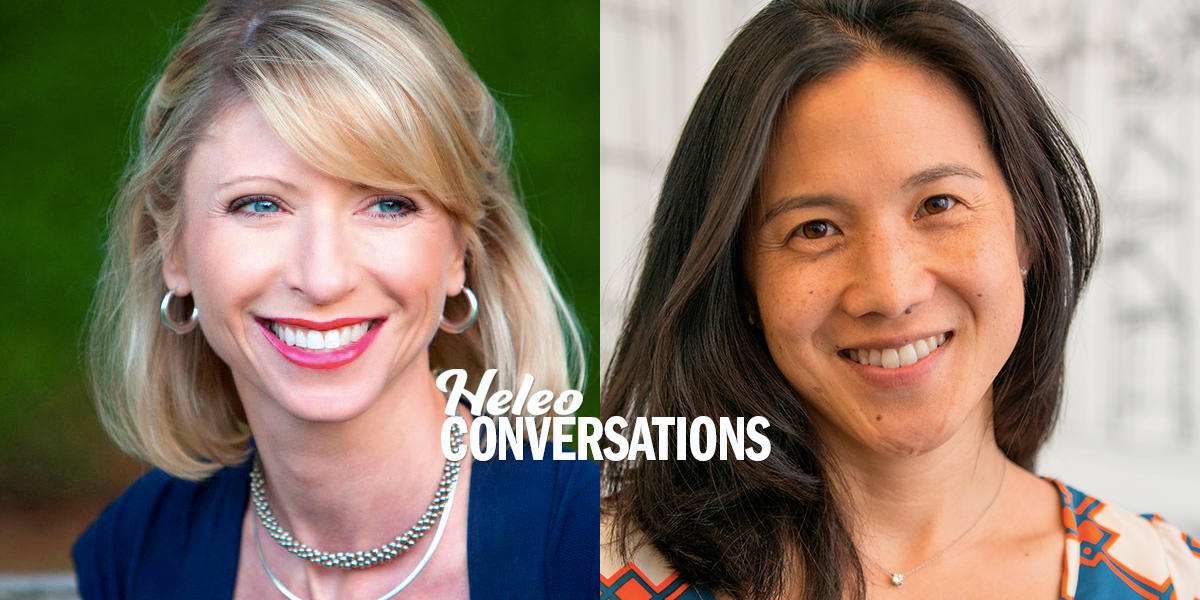Before Angela Duckworth advised the White House, received the MacArthur Genius Grant and completed her doctorate at Penn, she was a math teacher. She observed that some students who were quick studies did not earn the highest grades, and that some students who showed no initial aptitude for math were excelling by the year’s end. All her students had the potential to succeed, but it was clear that talent wasn’t the deciding factor for success – so what was the secret ingredient? After years of studying many people in challenging environments, she calls that secret ingredient grit.
Duckworth recently sat down with psychologist Amy Cuddy to discuss her bestselling new book, Grit: The Power of Passion and Perseverance. Cuddy is a professor and researcher at Harvard Business School, who studies how nonverbal behavior and snap judgments affect people. Her 2012 TED talk is the second most viewed talk in TED’s history, and she is the author of the bestseller Presence: Bringing Your Boldest Self to Your Biggest Challenges.
You can read their conversation below (condensed and edited).
Amy: What if you take the “how gritty are you” quiz, and you do really poorly? What do you do? Where do you go from there?
Angela: I think there are 2 things that might follow from an abnormally low grit score. The first is to ask whether you have exceptionally high standards. Recently I was in an auditorium where everybody was a varsity athlete at UNC, Tar Heels. One of the divers came up to me afterwards and said, “I was sitting next to this other diver, and let me just tell you, Dr. Duckworth, that is no 4.7.” He was referring to the grit score of the diver sitting next to him. After observing 4 years of practice and competition, he thought that this person inflated their score. They had a delusional level of high grit.
Amy: Fragile high grit?
Angela: Fragile high grit, yeah. I said, “What was your score?” He said he had a 3.5. I said, “Oh, that’s actually not as high as I would expect for a varsity level, nationally ranked competitive diver.”
Amy: Ouch.
Angela: Here’s the thing, though. When you take a questionnaire, and you know this as well as I do, part of what comes through is a signal, how gritty you are. But part of what comes through is a signal of how high your standards are. For that reason, if you have a low score, one question to ask is, by whose standards? This is among other reasons why I don’t think school districts should grade kids based on their self-report questionnaire metrics, like the grit scale. It’s not fair when you have high-performing schools – and I have data on this – high-performing schools have kids who rate themselves lower on grit, lower on self-control, lower on conscientiousness, than lower-performing schools in the exact same municipality. Maybe you’re being too hard on yourself.
There’s nothing about your grit score today that means that it will be your grit score next year.
But what if you’re not being too hard on yourself? What if you are legitimately lower than you would like on the grit scale, and it’s not because you are subjecting yourself to overly rigorous standards? I guess the question is, how do you feel about it? I’ve met people who don’t care. They’re like, “My interests are different every year. I don’t finish what I begin. I’m not a very hard worker, and I don’t care.” I say, “Great.” I didn’t write this book to make everybody gritty, but I made an effort to show people how to be grittier if that’s what they want. There’s nothing about your grit score today that means that it will be your grit score next year.
Amy: What do most parents want to understand about grit? My book isn’t geared towards parents and they really want to know, “How do I instill presence?” There’s a sort of panic about it, and I don’t have the answers yet. What do you most want them to understand?
Angela: Your kids are how old?
Trending: How to Transform Daily Habits into Life-Changing Rituals
Amy: I have one child, he’s almost 14.
Angela: I have a 13- and a 14-year-old at home, so we have overlapping challenges. Here’s the thing. I went to graduate school for psychology when I was 32. I was pregnant with one kid, and nursing the other. I grew up as a parent at the same time as I was growing up as a psychologist, and figuring out both things at once.
This question of what do I want to say to parents has not only been something on my mind in the last few weeks, but actually for the last 14 years. Here’s what I think the most important thing is; when I look at grit in full maturity, people like Will Shortz, the editor of the crossword puzzle for the New York Times, or a triple gold medalist swimmer, these are people that I want to reverse engineer. I want to ask, “What do you think about? What are your habits? What are your beliefs? What are your attitudes? What are your routines?,” so that we could not necessarily edit the crossword puzzle of the New York Times or be in the Olympics, but so we could be a little more excellent.
That said, I don’t think the lesson is that people should go home and immediately make their 7-year-old or 14-year-old practice for 4 to 5 hours a day, et cetera. It’s important to recognize that there is developmental progression.
I had a mom in an audience recently who I could just tell dragged her 7-year-old to my talk. Her questions were these urgent, “How do I get my kid to get into Harvard?” kind of questions.
The thing I wanted to say to that mom is the thing I want to say about parenting, which is that grit evolves over time. If you look at graphs of grit by age, it’s not realistic to think that kids at 7, 8, 14, 16 will have a goal that they will pursue with all their heart for decades, at all costs, and do hours of deliberate practice — the hardest kind of practice — every day, and be incredibly resilient. We would hope that eventually we could say those things about that child, but at the time that they’re a child, the most important thing is that kids develop interests. That means going out for soccer and seeing how the season goes, and at the end of the season if they don’t like soccer, maybe switching to another sport, or maybe not a sport.
I would say for passion and perseverance in parenting, passion comes first. Passion has these little seeds, and they’re quite ordinary, and they have nothing to do with parents chaining their kids to the violin stand or getting all crazy about hours and hours of the hardest kind of practice. That is something best left for maturity.
Amy: Thinking of parenting, I wanted to tell you a brief story about my son who, when he started 6th grade, had to do this self-assessment on a bunch of personality variables. Then he had to rate how he thought his teacher would rate him. It was a 1 to 4 scale, and he gave himself 1s on almost everything.
Angela: One being on the bad side?
Amy: Yeah. The school called.
Angela: They called?
Amy: He’s a very easy kid. I don’t get calls from the school very often. They’re like, “Jonah rated himself a 1. We’re very worried about his self-esteem.” I said, “I think I hear what’s going on.” He came home and I asked what happened. He said, “It’s just that we had to meet with our teachers after making these ratings. I wanted to maximize the discrepancy between my grading and theirs, so I knew that I’d feel good because they’d rate me higher on everything than I rated myself. It worked out really well.” I called them back and said, “Sorry, I’m a psychologist. He gets that sort of thing from me.”
Angela: I have a little data on something similar to that. In my research I have kids rate themselves on grit, self-control, and other qualities. And I have multiple teachers rate them, so I have a composite teacher score and a self score. Here’s what we find in our data: you’ve got a few kids who, like your son, under-rate themselves. You have a lot of kids, about 90 percent, who overrate themselves. Some of the kids overrate themselves a little bit, and some of them overrate themselves a lot. Before I tell you the results of this, I’m going to tell you my hypothesis, why I started looking at this.
I was on the phone with Paul DePodesta, the “Moneyball” guy. He was at the Mets before he left to play somewhere else, and he wanted to know about grit. I started telling him what I knew, and he wanted to know what I knew about self-control, and I told him about that. Then I turned the tables on him, and asked, “With your decades of observing players and young people grow up, what do you think is most important to success?” He said, “Three things; one is grit.” Check. “Two is self-control.” I also studied that. I really wanted to know the third thing, because I didn’t study anything else. And he said, “Self-awareness.”
“What do you mean by that?” I asked. “At the Mets,” he explained, “players are rated on baseball things. The coaches also rate the players, and the bigger the gap between how the players and the coaches see themselves, most typically go in the direction of players thinking that they’re a little better than they are. That predicts eventually how they’ll do, both on the field and off the field.”
I hang up the phone. I immediately go back to my data. I have data on self reports and other reports, and I proved his hypothesis right. In every data set that I’ve looked at, for kids who overrate themselves, the more they overrate themselves, the worse they do.
Trending: 5 Reasons Life Gets Better After Your 40s
Here’s the ringer, and this makes it all much more complicated: the more you overrate yourself, the more you have an inflated sense of how well you’re doing. Nothing is easy and straightforward. That’s not the book, that’s not yet published, but that’s what I’m finding.
Amy: Did you ever think that you would be a psychologist talking to baseball teams? I too have talked to major league baseball players. I spent a day with the Dodgers, and I was the only woman there. Tommy Lasorda and Don Mattingly were there. It was a couple years ago, and it was bizarre.
There are no psychologists who aren’t in some way coaches. What are we doing? We’re trying to get people to perform better.
Angela: First, I want to know what you told them, and then I’ll tell you how I feel about hanging out with coaches. What did you say to them? What did you say to the Dodgers?
Amy: It’s funny, I was asked to go talk to them because Gabe Kapler, who played for the Red Sox — super smart guy, really into science — now he’s working for the Dodgers and he wants to bring more scientists in to talk to them. He said, “Look, they’ve got all these rituals that they do before they go to bat. Why not give them one that works?”
He said, “Sometimes in the beginning of the season, your numbers might be really bad. Your face is up on the Jumbotron. You’re going out, you’re feeling terrible. The crowd is not with you. You need to feel powerful. What happens is, they become so distracted by how they think people are seeing them, and the outcome of what is going to happen if this doesn’t go well, they’re not present at all. How do we get them back into the moment, because all they’ve got to do at that point is focus on hitting the ball. That is the only thing that matters, but they’re so distracted by all of these other things, so how do we do that?” It really ultimately was about presence in those very stressful moments.
Angela: Like you, I was like, “What’s a wild card? There’s offense, and there’s defense, and then there’s another thing, special forces or special ops?” My credibility with my coaches is plummeting. Did I think that I’d be hanging out at the Garden with Brad Stevens for an hour in his office, talking about psychology? No, I did not think that, but this is the reason why we do this kind of stuff, like talk to coaches.
There are no psychologists who aren’t in some way coaches. What are we doing? We’re trying to get people to perform better. There are absolutely no coaches who are not psychologists. That’s all they do.
Amy: They’re fantastic psychologists. I was a ballet dancer, I was not a sporty person, but I’ve been working so much with coaches. They really understand how people work.
Angela: They actually apply ideas. They don’t just write a paper like, “Oh, this is the finding.” They have to take that finding and make it work, with all the other complex things that have to happen. I think that is even harder.
Amy: When I first started doing the work that I’m doing on posture and how it affects our mindset and performance, I was focused on concrete outcomes and performance. I was thinking about my students: how could I get them through this, get them to participate, help them do well in job interviews?
When I started hearing back from people after the TED talk, they weren’t talking about the outcomes as much as they were talking about how they felt when they left the stressful situation. For them, the key was, did they feel seen? Did they feel like they represented themselves accurately? Did they feel like, “Oh, I didn’t show them who I really am?” That sense of regret haunted them.
It started to make me ask, how does this work relate to well-being and moving forward in life, and being able to live with outcomes even if they’re not the ones that you desired? How does grit relate to well-being and happiness for the person who is gritty, and for that person’s family?
Angela: I’ll start by saying I don’t think achievement, which is really what I study, is synonymous with success. Success is a broader thing. It’s what you really want to be, and that might include being a great dad, or a really great friend. I have this one friend — and he knows who he is — and he’s the best friend. He’s not my best friend, he just excels in being a friend. Everybody knows he’s the best friend there is, the most loyal, the most everything. That’s not really the same thing as achievement. For a lot of people, success can be spirituality or religious beliefs, and that’s not the same thing as achievement, either.
The fact that I study the psychology of achievement is not because I don’t think there are other things that go into a successful or good life. But when you look at grit scores and measures of life satisfaction, we get this straight line relationship; even at the very tippy-top of the grit scale, the more grit you have, the more happiness you report. That’s what the data say. I’m not saying grit will make you happy, but I’m not seeing a huge cost to your well-being.
Trending: 5 Simple Strategies for Persuading Anybody
What I don’t know is whether the people who live with the super-gritty people are happy. That’s not in the data set, and there’s a fair question there, because there are trade-offs in life. Maybe people who work that hard and are that single-minded about a certain goal, maybe there are costs. Maybe they’re not the best fathers or mothers, or maybe they’re not the best friends. That’s certainly a reality.
The second thing I’ll say is, I asked my own kids. When I work, I’m not cooking dinner or helping my kids with their homework. I’m working all the time. I asked Amanda and Lucy [my daughters], “Would you rather I be a little less gritty?” They said, “Sometimes.” Then, they thought about it for a moment and said, “We’re really proud of you, and we think you’re pretty great.”
I think that the fact that I come home every day, and I am so in love with my work, and that I do hard things like write a book, and I finish whatever I begin, overall I think that the loved ones in my life appreciate it.
Amy: One of the neat things you mentioned is that as we get older, we get grittier. There are not many things like that.
Angela: No, most things just get worse.
Amy: People don’t know that actually most of my research is on prejudice and stereotyping. My very first paper was called “Doddering but Dear,” and it was about stereotypes of elderly people. We see them as really sweet and likeable and not competent. It’s awful. I hear from so many retirees who say, “My sense of pride is gone. People treat me like I’m a child. They treat me like I’m an idiot.” How does grit relate to competence for older people? That made me really happy and hopeful, like, “I want to share that message, as we get older, we get grittier.”
What’s wrong with millennials? They haven’t grown up yet.
Angela: I got emails from really mad millennials. I don’t know if they actually read the article, because it was actually very pro-millennial. I said, “Look, in my data– millennials are the bottom of the heap in grit.” They probably stopped reading right there. Seriously, they didn’t have enough grit to read the rest of the article. It was 1,000 words, it was not that long of an article.
As I said, and this is true, I have lost count of the number of 50-, 60- or 70-year-olds who have complained to me that millennials don’t know how to work hard, that they haven’t learned that success in life takes years of determination, complain when they have to take work home over the weekend, sigh loudly when they’re still there and it’s 5:01. They talk about this generation and they’re like, “God, these kids are just not the way I was when I was 22.”
If you actually look at the data that I have, you cannot tell, in my cross-sectional snapshot, whether these older adults are right (which is that millennials grew up in a cultural era that didn’t encourage passion and perseverance). Alternatively, the same data could tell the story of maturity, that as a 60-year-old you have 3 times as much life experience as the 20-year-old you’re complaining about, and it’s really that that’s driving it.
In psychology, we would call it the maturity principle. Things like grit, and also — I’ll just throw them in for you, because this is all good news — conscientiousness, emotional stability, dependability, impulse control, wisdom … all of these things are likely to get better with age. That has been shown not in snapshot studies, but in moving studies, where you follow the same people over time.
I can’t decide in my data which of those two hypotheses is true, that the millennials are victims of cultural forces that are eroding their grit, or that they haven’t grown up yet. If you look at the preponderance of longitudinal data that’s been collected, overwhelmingly it supports the maturity hypothesis, which is how I ended the article. “What’s wrong with millennials? They haven’t grown up yet.”
Anyway, what I was saying about the good news about getting older and so forth is exactly to your point. Some things get worse: our hips, our knees, our teeth, our eyesight, our IQ. But some things get better. Expertise gets better. I don’t want to have a really bright 20-year-old do my surgery. The world is such an imperfect place, and if people who are at the peak of their character, in their 50s, 60s and 70s, could be allowed to help fix things, then it would be better for everybody.





























